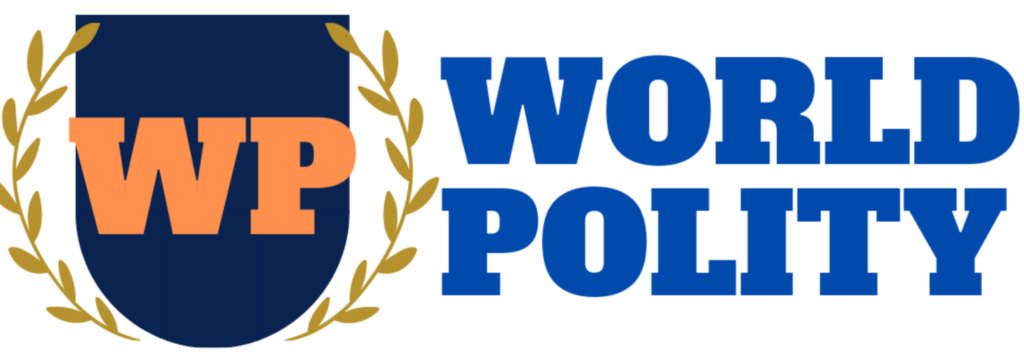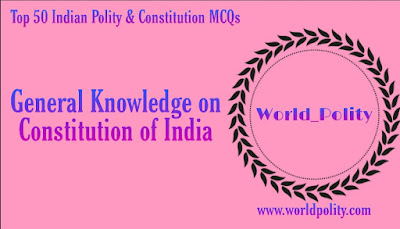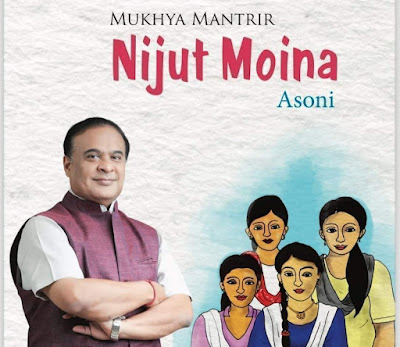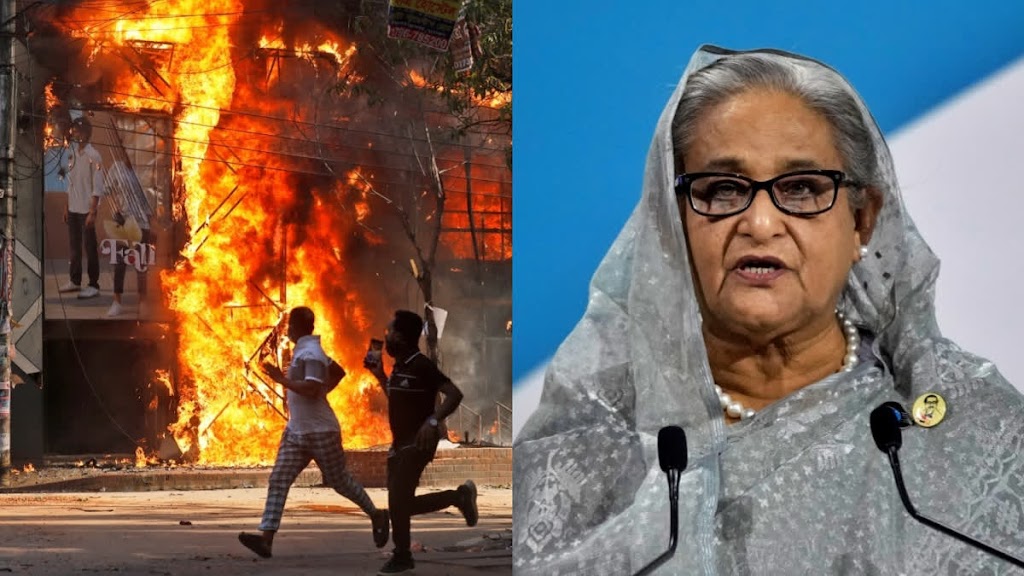Best 50 Indian Polity & Constitution GK Questions and Answers (MCQs) for Competitive Exams Set – 1
Hello, aspirants are you preparing for UPSC/APSC or any other Govt Exams 2021? If yes, then you must be aware of the most important MCQ on Constitution of India & Indian Polity for the upcoming exam preparation. Therefore every aspirants need to know the important GK questions and answers as MCQ on Constitution of India for UPSC & APSC and other govt exams. In this regard “World_Polity” decides to provide you the most important MCQ on Constitution of India & Indian Polity for UPSC in different sets for the upcoming exams. Infact the Indian Polity & Constitution Objective-Multiple Choice (MCQs) will be a key topic in the Indian Polity section for the upcoming exams. So the Indian Polity & Constitution GK for UPSC 2021 will be a pedestrian to crack your exam.
Indian Polity & Constitution GK Questions and Answers
In this article we have provided you Indian Polity & Constitution GK questions and answers for IAS Prelims. So, read all these important Indian Constitution Quiz for the upcoming UPSC Prelims & Mains exam as well as other govt exams. These Indian Polity & Constitution MCQs are extremely important and should be a part of your preparation.
GK Questions on Constitution of India
In order to succeed in the prestigious competitive examination, it is important that the aspirant has access to the all the Indian Polity GK Questions and answers on Constitution. Specially the toppers of civil services exam recommend that aspirant start their preparation with the most important topics of syllabus such as GK Questions on Constitution of India for the upcoming exams.
Objective question(MCQs)- Constitution of India
In this sets of Indian Constitution test series there are two very important Objective question(MCQs) on Constitution of India . They are :
1. In Indian Constitution, the idea of “A Union of States in the Indian Constitution” has been derived from
(a) Constitution of Belgium
(b) The Australian Constitution
(c) Constitution of Colombia
(d) Constitution of Bhutan
Ans : (b) The Australian Constitution
2. Which part of the Indian Constitution deals with Official Language?
(a) XVII
(b) XVI
(c) X
(d) XV
Ans : (a) XVII
MCQ on Constitution of India & Indian Polity
Here are the best 50 Indian Polity & Constitution GK Questions and Answers (MCQs). Read all these important MCQ on Constitution of India & Indian Polity for UPSC in order to answer the questions.
1. The Governor of a State is appointed by the President on the advice of the
(a) Prime Minister
(b) Vice- President
(c) Chief Minister
(d) Chief Justice
Answer: (a) Prime Minister
2. The President gives his resignation to the
(a) Chief Justice
(b) Parliament
(c) Vice President
(d) Prime Minister
Answer: (c) Vice President
3. For what period does the Vice President of India hold office ?
(a) 5 years
(b) Till the age of 65 years
(c) 6 years
(d) 2 years
Answer: (a) 5 years
4. Who among the following holds office during the pleasure of the President ?
(a) Governor
(b) Election Commissioner
(c) Speaker of Lok Sabha
(d) Prime Minister
Answer: (a) Governor
5. Which of the following is not true regarding the payment of the emoluments of the President ?
(a) They can be reduced during a Financial Emergency.
(b) They are shown separately in the budget.
(c) They are charged on the Contigency Fund of India.
(d) They do not require any parliament sanction.
Answer: (c) They are charged on the Contigency Fund of India.
6. The total number of members nominated by the President to the Lok Sabha and the Rajya Sabha is
(a) 16
(b) 18
(c) 14
(d) 12
Answer: (c) 14
7. Which one of the following does not constitute the electoral college for electing the President of India ?
(a) Elected members of Lok Sabha
(b) Elected members of the Legislative Assembly of each state.
(c) Elected members of the Legislative Council
(d) Elected members of Rajya Sabha
Answer: (c) Elected members of the Legislative Council
8. The council of Ministers in a Parliamentary type of Government can remain in office till it enjoys the support of the
(a) Minority of members of the Upper House of Parliament
(b) Majority of the members of the Upper House of Parliament
(c) Minority of members of the Lower House
(d) Majority of the members of the Lower House of Parliament
Answer: (d) Majority of the members of the Lower House of Parliament
9. Which of the following appointments is not made by the President of India ?
(a) Chief of the Army
(b) Speaker of the Lok Sabha
(c) Chief Justice of India
(d) Chief of the Air Force
Answer: (b) Speaker of the Lok Sabha
10. Who appoints the Prime Minister of India ? (a) Lok Sabha
(b) President
(c) Parliament
(d) Citizens of India
Answer: (b) President
11. The first woman Governor of a state in free India was
(a) Mrs. Indira Gandhi
(b) Mrs. Vijaya Laxmi Pandit
(c) Mrs. Sarojini Naidu
(d) Mrs. Sucheta Kripalani
Answer: (c) Mrs. Sarojini Naidu
12. Minimum age required to contest for Presidentship is
(a) 23 years
(b) 21 years
(c) 35 years
(d) 30 years
Answer: (c) 35 years
* Must Read – Key Highlights of Union Budget 2021
* Must Read – Union Budget 2021 Quiz
13. The charge of impeachment against the President of India for his removal can be preferred by
(a) Both Houses of Parliament
(b) Speaker of Lok Sabha and Chairman of Rajya Sabha
(c) Rajya Sabha
(d) Lok Sabha
Answer: (a) Both Houses of Parliament
14. The Chief Minister of a Union Territory where such a set up exists, is appointed by the
(a) Lt. Governor
(b) Majority party in Legislature
(c) President
(d) Prime Minister
Answer: (a) Lt. Governor
15. Who was the first Prime Minister of India ?
(a) Jawaharlal Nehru
(b) Mrs. Indira Gandhi
(c) Dr. Rajendra Prasad
(d) Mahatma Gandhi
Answer: (a) Jawaharlal Nehru
16. In case a President dies while in office, the vice President can act as President for a maximum period of
(a) 1 years
(b) 3 months
(c) 6 months
(d) 2 years
Answer: (c) 6 months
17. The Union Council of Ministers consists of
(a) Cabinet Ministers, Minister of State and Deputy Ministers
(b) Cabinet Ministers and Chief Ministers of the States
(c) Prime Minister
(d) Cabinet Ministers
Answer: (a) Cabinet Ministers, Minister of State and Deputy Ministers
18. Who administers the oath of office to the President of India before he enters upon the office ?
(a) Chief Justice
(b) Speaker
(c) Vice President
(d) Prime Minister
Answer: (a) Chief Justice
19. Who among the following enjoys the rank of a Cabinet Minister of the Indian Union?
(a) None of the Above
(b) Deputy Chairman of the Planning Commission
(c) Deputy Chairman, Rajya Sabha
(d) Secretary to the Government of India
Answer: (b) Deputy Chairman of the Planning Commission
20. A person who is not a member of Parliament can be appointed as a Minister by the President for a maximum period of
(a) 9 months
(b) 3 months
(c) 12 months
(d) 6 months
Answer: (d) 6 months
21. When can a President use his discretion in appointing the Prime Minister ?
(a) When no political party enjoys a clear majority in the Lok Sabha.
(b) Only when the Lok Sabha has been dissolved.
(c) In all circumstances
(d) In no circumstances
Answer: (a) When no political party enjoys a clear majority in the Lok Sabha.
22. If in a country there happens to be the office of monarchy as well as a Parliamentary form of government this monarch will be called
(a) Head of the State
(b) Head of the Cabinet
(c) Head of the government
(d) Both Head of the government and State
Answer: (a) Head of the State
23. One feature distinguishing the Rajya Sabha from the Vidhan Parishad is
(a) Power of impeachment
(b) Indirect election
(c) Nomination of members
(d) Tenure of membership
Answer: (a) Power of impeachment
24. Chief Ministers of all the states are ex-officio members of the
(a) Planning Commission
(b) National Development Council
(c) Inter State Council
(d) Finance Commission
Answer: (c) Inter State Council
25. Who, among the following, has the final right to sanction the expenditure of public money in India ?
(a) Speaker
(b) President
(c) Prime Minister
(d) Parliament
Answer: (b) President
26. Which of the following is not an essential qualification for appointment as a Governor ?
(a) He must not be a member of either House of Parliament.
(b) He should be a domicile of the state to which he is being appointed.
(c) He should be a citizen of India.
(d) He must have completed the age of 35 years
Answer: (b) He should be a domicile of the state to which he is being appointed.
27. The President nominates 12 members of the Rajya Sabha according to
(a) Their performance as office bearers of cultural societies.
(b) The recommendations made by the Vice President.
(c) Their role played in political set up of the country.
(d) Their distinction in the field of science, art, literature and social service.
Answer: (d) Their distinction in the field of science, art, literature and social service.
28. Which Article of the Constitution empowers the President to appoint a Commission to investigate the condition of backward classes in general and suggest ameliorative measures?
(a) Art 342
(b) Art 344
(c) Art 340
(d) Art 339
Answer: (c) Art 340
29. Who can initiate impeachment proceedings against the President of India ?
(a) Either House of Parliament
(b) Any Vidhan Sabha
(c) Only Lok Sabha
(d) Rajya Sabha
Answer: (a) Either House of Parliament
30. Who was the member of the Rajya Sabha when first appointed as the Prime Minister of India?
(a) Lal Bahadur Shastri
(b) Charan Singh
(c) Morarji Desai
(d) Indira Gandhi
Answer: (d) Indira Gandhi
31. What is the minimum age for appointment as a Governor ?
(a) 35 years
(b) 40 years
(c) 25 years
(d) 30 years
Answer: (a) 35 years
32. Chief Minister of a State is responsible to
(a) Prime Minister
(b) Rajya Sabha
(c) Legislative Assembly
(d) Governor
Answer: (c) Legislative Assembly
33. The administrative and operational control of the Armed Forces is exercised by the
(a) Cabinet Committee on Political Affairs with Prime Minister as the Chairman
(b) Ministry of Defence
(c) Three Chiefs of the Army, Navy and Air Force Staff
(d) President
Answer: (b) Ministry of Defence
34. What is the position of a Minister of State in the Central Government ?
(a) He is a Minister of Central Government but not a member of the Cabinet.
(b) He looks after the interests of the State Cabinet.
(c) He is the nominee of the State Governor.
(d) He is the nominee of the State Cabinet.
Answer: (a) He is a Minister of Central Government but not a member of the Cabinet.
35. Who among the following is directly responsible to Parliament for all matters concerning the Defence Services of India ?
(a) President
(b) Prime Minister
(c) Defence Minister
(d) Cabinet Committee on Political Affairs
Answer: (c) Defence Minister
36. How many times the President of India can seek re-election to his post ?
(a) Once
(b) 3 times
(c) 2 times
(d) Any number of times
Answer: (d) Any number of times
37. Who among the following has the power to form a new state within the Union of India ?
(a) Speaker of Lok Sabha
(b) President
(c) Prime Minister
(d) Supreme Court
Answer: (b) President
38. Is the Prime Minister bound to advise the President on matters on which his advice is sought ?
(a) If the Council of Ministers so desires.
(b) Yes
(c) No
(d) It is discretionary
Answer: (b) Yes
39. When the Vice President officiates as President he draws the salary of
(a) Chairman of Rajya Sabha
(b) President
(c) Both (A) and (B)
(d) Member of Parliament
Answer: (b) President
40. Who among the following can attend meetings of the Union Cabinet ?
(a) President
(b) Cabinet Ministers
(c) Ministers of State
(d) Deputy Ministers
Answer: (b) Cabinet Ministers
41. Who among the following has the Constitutional authority to make rules and regulations fixing the number of members of the UPSC
(a) Vice- President
(b) President
(c) Home Ministry
(d) Cabinet Secretary
Answer: (b) President
42. Under whose advice the President of India declares Emergency under Article 352 ?
(a) Chief Ministers of all states
(b) Prime Minister
(c) Cabinet
(d) Council of Ministers
Answer: (c) Cabinet
43. Who acts as the President of India when neither the President nor the Vice President is available ?
(a) Seniormost Governor of a State
(b) Chief Justice of India
(c) Speaker of Lok Sabha
(d) Auditor General of India
Answer: (b) Chief Justice of India
44. A proclamation of emergency issued under Article 36 must be approved by the Parliament within
(a) 3 months
(b) 2 months
(c) 1 Month
(d) 6 weeks
Answer: (b) 2 months
45. The Union Council of Ministers is appointed by the
(a) President of India according to his discretion
(b) President of India on the advice of the Prime Minister
(c) Prime Minister of India
(d) Parliament
Answer: (b) President of India on the advice of the Prime Minister
46. The President can proclaim emergency on the written advice of the
(a) Speaker of Lok Sabha
(b) Prime Minister
(c) Chief Justice of India
(d) Union Cabinet
Answer: (b) Prime Minister
47. The Union Council of Ministers is collectively responsible to
(a) Rajya Sabha
(b) President
(c) House of the People
(d) Prime Minister
Answer: (c) House of the People
48. Article 78 of the Constitution deals with
(a) President’s power to get information from the Council of Ministers.
(b) Prime Minister’s duty regarding keeping the President informed about the government’s decisions and policies.
(c) Emergency powers of the President
(d) President’s power to send advisory messages to the Parliament.
Answer: (d) President’s power to send advisory messages to the Parliament.
49. The maximum duration for which the Vice President may officiate as the President, is
(a) 1 year
(b) 6 months
(c) 4 months
(d) 9 months
Answer: (b) 6 months
50. The President’s Rule in a State can be continued for a maximum period of
(a) 2 years
(b) 1 year
(c) 6 months
(d) 3 months
Answer: (c) 6 months
Next : Set 2
Now World_Polity is on every platform to give you each & every update.
* Most Related Searches :
* GK Questions & Answers on Indian Polity and Governance set – 1
* GK Questions & Answers on Indian Polity and Governance set – 2
* List of Best Guide Books for APSC
Hello if you like the Indian Polity Quiz for UPSC IAS Prelims 2021 – Indian Polity GK Questions & Answers do comment & show your support by sharing it to the other aspirants and if there is any query you are welcome to ask.



